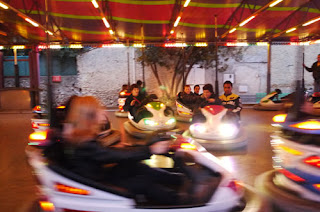Part 2: Driving Miz Crazy
 There is nothing more exciting than speeding down a one lane country road while your driver is talking and looking you in the back seat. It’s the fun part of looking for houses with estate agents--realtors. They know the roads and love being out in the French vineyards and sunshine. And since they want to show you several houses in an hour or so, they go as fast as they can between them.
There is nothing more exciting than speeding down a one lane country road while your driver is talking and looking you in the back seat. It’s the fun part of looking for houses with estate agents--realtors. They know the roads and love being out in the French vineyards and sunshine. And since they want to show you several houses in an hour or so, they go as fast as they can between them.
It adds a touch of danger to house hunting that you won’t find anywhere else.
So if the itch hits you, here are some more tipsfor finding a house in the South of France.
Tip 6. Negotiation. The asking price of a house is usually negotiable but estate agents don’t like lower prices because they cut into their fees. In France as elsewhere owners think their homes are worth more than they are asking for anyway but you need to bargain. The current recession means there’s a surplus of houses and not too many (or any) buyers. It is truly a buyer’s market.
 |
| Looks good but it the whole top floor of a house. |
Tip 7. Notaire Fees. On top of the price of the home you the buyer has to pay for a “notaire” or a notary to do the paperwork; title searches etc… The notaries represent the French state and not either party in arranging the sale. The work of the notaire takes about two months. It’s all paperwork and grind slowly indeed. The notaire’s fee varies (it’s about 7-9% of the selling price) but it will adds thousands of Euros to the cost of the house.
Often when buying directly from a seller an under the table payment is negotiated to reduce their taxes and your notaire fee. For example, if the asking price is 175,000 Euros the seller might take 150,000 officially and you’ll give them a separate check for 25,000.
 |
| How did this big bed get to the 3rd floor?. |
Curiously some notaries will leave the room once the officials papers are signed to "go out for a smoke’.' But it is really so that the extra check can be passed between buyer and seller in private.
Tip 8. Furniture Issues. When buying a village house consider negotiating with the owner to have them include the furniture in the deal. When you see a big bed in a third floor bedroom you have to wonder how it got up very narrow circular stairway. Owners are often happy to avoid having to remove things by including them in the sale.
Tip 9. The Crazy Brits. There are a lot of homes around the South of France that were bought by British people in the last decade or so. They’ve remodeled them and many are now on the market. You can tell a Brit’s home the second you walk into it. They have cut every corner possible and have create a little British village house in the middle of France. Paisley and floral wallpaper (to remove), faux ”oriental” features (to trash) and all sorts of strange tinkering (see photo). The Brits also favor small electric “hobs” with convection no oven to actual stoves.
 |
| No stairway to heaven it's the attic access. |
My favorite corner cutter is the jet toilet. An ugly, water saving toilet that sounds like a jet plane taking off each time you use it.
Buying a home from a Brit add 10% for the work you’ll need to do to make it a tolerable place to live.
Tip 10. Size Matters. We all grew up on movies like the Three Musketeers with sword fights up and down huge staircases. Well those were Hollywood sets. Rooms in real castles are tiny and a village house can be really very small. When you’re looking for a house in France you need to scale back your size expectations. Our 3 bedroom house in Washington State had 2000 square feet (200+ sq. meters) of living space and was as one realtor put it “kinda small.” Now that we’ve been in France we are excited when we find a place with 1100 sq.ft.(120 sq.meters) of living space.
 |
| No room for the 3 musketeer fights. |
But when you find that place in the village of your choice you’ll find that life takes on a whole different dimension. And after all that’s why you go through the whole exercise in the first place.














































